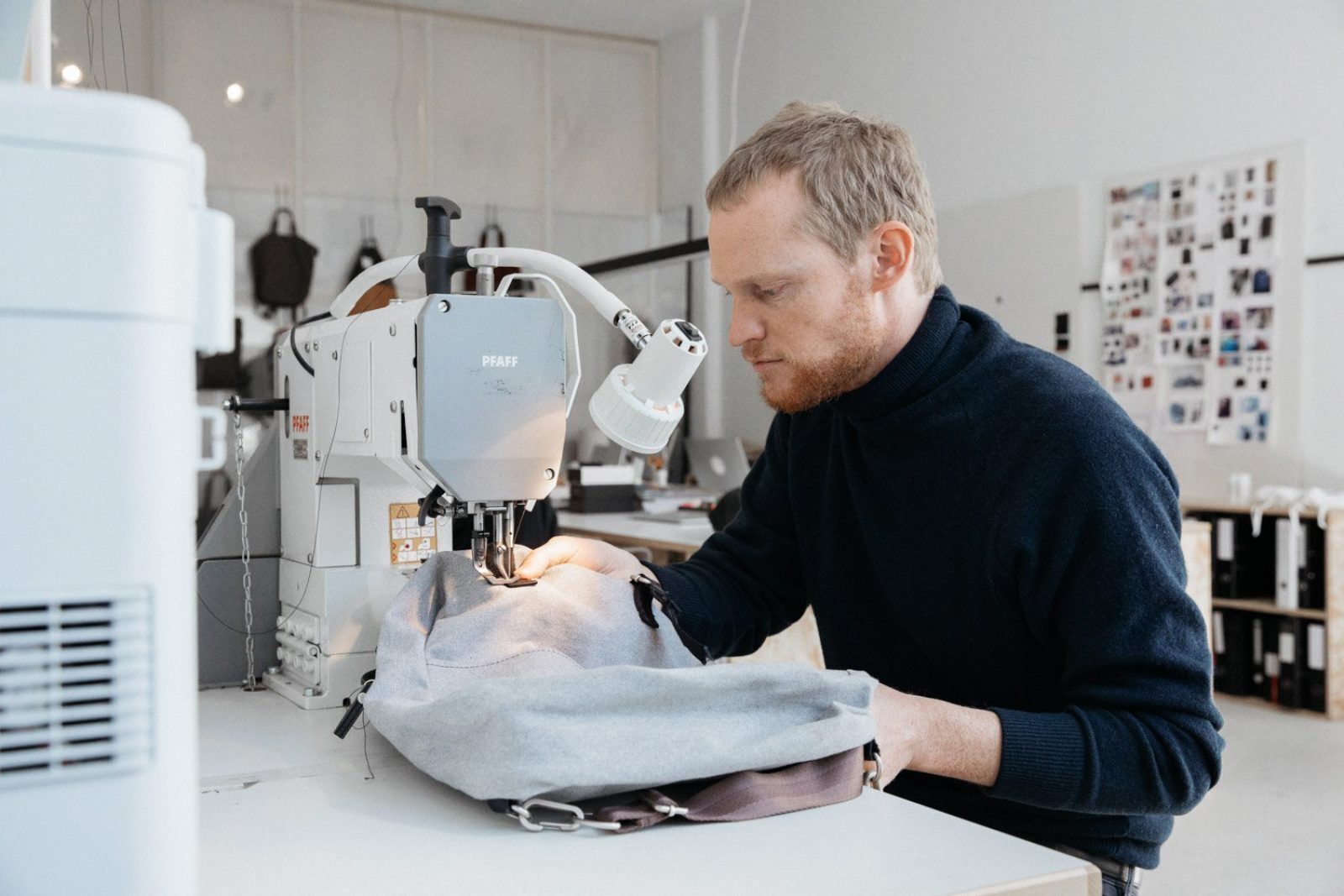reel series
Bananas to the rescue

A visit to trendy Zurich District Four. This is where Qwstion designs and sells its bags, accessories and jackets made of natural fibres. Swiss Textiles takes a look behind the scenes with founder, Christian Kaegi, and finds out why he and his team prefer plants to plastic or ships to trucks and how they use bananas to make fashionable pieces.
“Why are all bags and backpacks made of plastic?” Christian Kaegi, Fabrice Aeberhard, Matthias Graf, Hannes Schoenegger and Sebastian Kruit, asked that question back in 2008.
Indeed, two-thirds of global textile products in the fashion industry are made of synthetics. Most of them go on to harm the environment. Because no effective recycling methods exist as yet and because shirts, pullovers and trousers release microplastics when they are laundered.
Why are all bags and backpacks made of plastic?
Bags made of a material designed in-house
The five men already knew each other from previous work projects. They came together again over the question “Why?” and went on to found their joint company Qwstion (pronounced “Question”). Bags, accessories and jackets are made from socially and ecologically responsible Bananatex. That is a material developed in-house which has now been certified and consists of fully recyclable banana fibres. Their company motto is “plants not plastic.” With the smallest possible ecological footprint.
Here on Badenerstrasse in Zurich District Four, where the design studio and shop are located, their logo can often be seen on the back of a cyclist or passer-by. The products are also on sale at Globus in Zurich. Pop-ups have been opened in other Swiss cities, as well as in Berlin and Vienna.
From cotton to bananas
At the outset their first collections consisted mainly of conventionally grown cotton. “The problem about this is that too much water and farmland have to be used,” Christian, the industrial designer and one of the company’s founders, explains. He saw great potential for improvement here. So the team of 20 persons set about their research. For several years. They tested linen, bamboo and hemp. None of those natural fibres gave convincing results.
Suddenly they hit upon the Abacá banana – also known as Manila hemp – which grows wild on the Philippines and bears no edible fruit. “The good thing is that they grow in a permaculture. In other words they get by without water, pesticides and fertilizers,” he explains. They are taken from a healthy ecosystem. What is more, the grey-brown fibres are long, tearproof and robust. Centuries ago the local population already made ropes and paper from banana fibres. Today they are used mainly in the paper industry – primarily for tea bags or cigarettes.
The good thing about the banana is that it grows in a permaculture. In other words it gets by without water, pesticides and fertilizers.
Searching, testing – and rejecting
Christian and his team went on testing and designing, time and time again. Designs and ideas went overboard. Ten years after Qwestion’s inception they were ready: Matthias, Christian and Hannes – the other two had pulled out in the meantime – launched “Bananatex” on the market in 2018. A 100 per cent compostable material which uses no synthetics and is also available to other makers as an open source project.
The material is spun, woven and sewn in Taiwan. The finished material is then shipped to China, the Czech Republic, Croatia and Switzerland where backpacks, travel and laptop bags are made.
Truck versus ship
What about the footprint of transport from the Far East? Christian smiles. “A good question. We asked ourselves that same question. But the latest data from the German Federal Office of the Environment shows that the transport distance plays a much smaller role”, he explains. By ship the footprint is twenty times lower per unit of weight than by truck.
Better than awards
The awards that followed soon after the material had been launched were to prove him right. In 2019 they won the “Green Product Award” and the “Swiss Design Prize 2019/20”. In 2021, they were presented with the German “Sustainable Design Prize”. In that same year, Bananatex was granted the Cradle to Cradle gold standard certificate which recognizes responsible and safe products made in the circular economy. They already have 20,000 followers on Instagram. By now even H&M and COS have opted for Bananatex and are using the material in their products.
However, Christian takes the view that still better than awards and many followers is the knowledge that he and his team have done something for nature and people. And all because of a simple question which lay at the start of their story.
This article was written as a part of our reel series on social media.